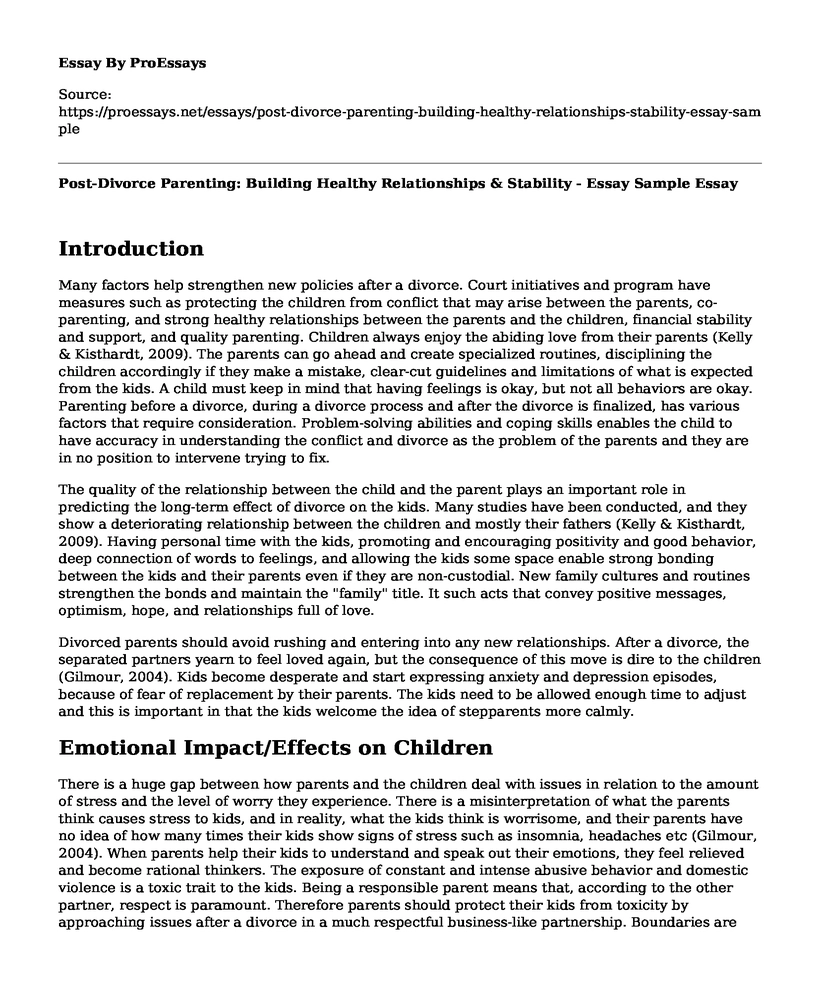Introduction
Many factors help strengthen new policies after a divorce. Court initiatives and program have measures such as protecting the children from conflict that may arise between the parents, co-parenting, and strong healthy relationships between the parents and the children, financial stability and support, and quality parenting. Children always enjoy the abiding love from their parents (Kelly & Kisthardt, 2009). The parents can go ahead and create specialized routines, disciplining the children accordingly if they make a mistake, clear-cut guidelines and limitations of what is expected from the kids. A child must keep in mind that having feelings is okay, but not all behaviors are okay. Parenting before a divorce, during a divorce process and after the divorce is finalized, has various factors that require consideration. Problem-solving abilities and coping skills enables the child to have accuracy in understanding the conflict and divorce as the problem of the parents and they are in no position to intervene trying to fix.
The quality of the relationship between the child and the parent plays an important role in predicting the long-term effect of divorce on the kids. Many studies have been conducted, and they show a deteriorating relationship between the children and mostly their fathers (Kelly & Kisthardt, 2009). Having personal time with the kids, promoting and encouraging positivity and good behavior, deep connection of words to feelings, and allowing the kids some space enable strong bonding between the kids and their parents even if they are non-custodial. New family cultures and routines strengthen the bonds and maintain the "family" title. It such acts that convey positive messages, optimism, hope, and relationships full of love.
Divorced parents should avoid rushing and entering into any new relationships. After a divorce, the separated partners yearn to feel loved again, but the consequence of this move is dire to the children (Gilmour, 2004). Kids become desperate and start expressing anxiety and depression episodes, because of fear of replacement by their parents. The kids need to be allowed enough time to adjust and this is important in that the kids welcome the idea of stepparents more calmly.
Emotional Impact/Effects on Children
There is a huge gap between how parents and the children deal with issues in relation to the amount of stress and the level of worry they experience. There is a misinterpretation of what the parents think causes stress to kids, and in reality, what the kids think is worrisome, and their parents have no idea of how many times their kids show signs of stress such as insomnia, headaches etc (Gilmour, 2004). When parents help their kids to understand and speak out their emotions, they feel relieved and become rational thinkers. The exposure of constant and intense abusive behavior and domestic violence is a toxic trait to the kids. Being a responsible parent means that, according to the other partner, respect is paramount. Therefore parents should protect their kids from toxicity by approaching issues after a divorce in a much respectful business-like partnership. Boundaries are established, and there is always a clear agenda when it comes to discussing issues involving the kids.
Interventions that are based entirely on facts have been proven to have a positive effect on the children. Group support for children, making the misconceptions clearer and educating them on methods of being good communicators with their parents (Gardner, 1975). The organized programs have various benefits for children of all ages and assists in adjusting both socially and emotionally.
Conclusion
Cases of separation and child custody decisions have significantly increased, and recognizing the negative effects on kids will help in devising new methods of protecting them. The three most important factors in protecting children are good parenting that incorporates both comfort and discipline, maintaining healthy parent-child relationships, and resolving disputes. Developing the ability to connect with the kid's suppressed thoughts to enable them to express their concerns under the parents' ability to effectively mentor and create strong bonds. Strategies that are factual-based for kids and initiatives that reinforce parenting skills help families while also providing a valuable need for further study. Most children today have benefited immensely from the enduring love and ambition of their parents to consider their interest first-ahead of their own emotional turmoil and long nights.
References
Cashmore, J., & Parkinson, P. (2008). Children and parent's perceptions on children's participation in decision making after parental separation and divorce. Family Court Review, 46(1), 91-104.
Gardner, R. A. (1975). Parental Divorce and the Needs of Children. Concil. Cts. Rev., 13, 1.
Gilmour, G. A. (2004). High-conflict Separation and Divorce: Option for Consideration. Department of Justice Canada.
Kelly, J. B., & Kisthardt, M. K. (2009). Helping parents tell their children about separation and divorce: Social science frameworks and the lawyer's counseling responsibility. J. Am. Acad. Matrimonial Law., 22, 315.
Wallerstein, J. S., & Lewis, J. (1998). The long-term impact of divorce on children: A first report from a 25-year study. Fam. & Concil. Cts. Rev., 36, 368.
Cite this page
Post-Divorce Parenting: Building Healthy Relationships & Stability - Essay Sample. (2023, Apr 06). Retrieved from https://proessays.net/essays/post-divorce-parenting-building-healthy-relationships-stability-essay-sample
If you are the original author of this essay and no longer wish to have it published on the ProEssays website, please click below to request its removal:
- Influence of Computers
- Anthropology Analysis of Attitude Towards People Depending on the Profession
- Essay Sample on Social Networking
- The Influence of Parental Style on Adolescent Behavior Essay Example
- Essay Example on Unlock Collective Power: Civil Engagement and Interests Groups
- Paper Sample on Effective Health Histories: Communication & Interview Techniques
- Racism & Protesting - Free Research Paper Sample







